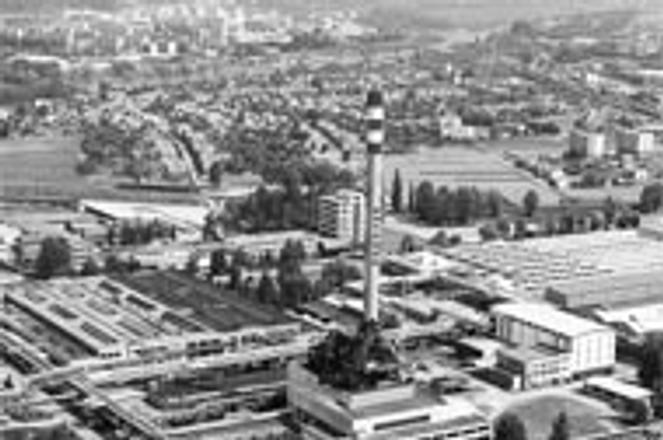Bullish business. Matador employs 2,500 people at its Púchov plant in the Váh river valley.Števo Kačena
PÚCHOV- While the state-owned Slovak military-industrial complex in the Váh River valley is stuck at the conversion corner, another large enterprise in the same area is expanding on its successful civil consumer base.
This past April, Matador, the giant rubber producer in this northwestern Slovak town of 18,000 on the Váh, opened a factory 7,000 kilometers away in the Siberian city of Omsk. A leading light for Slovak investment eastward, Matador joined its Russian partner in the venture known as Matador-Omskshina to more efficiently fulfill the company's existing contract to sell tires to a Russian Lada car factory.
"We came to a point where we realized that it would be more economical to produce tires there instead of exporting [them from Slovakia]," said Pavel Melišík, who spearheaded Matador's move to Omsk.
Distractions
Investing in Russia still has its frustrations, Melišík conceded. Compared to European standards, Melišík said Russia's "regulations and customs seemed to be incomprehensible at first. The bureaucracy is very complicated, and the start of production was delayed by at least one month because of it."
There were other distractions, as well. Around the time production started, the Russian chairman of Matador-Omskshina's board of directors, Oleg Certov, was killed, and much of Czech competitor Barum's stock in Moscow was burned. Russian daily papers suggested that the timing of these events was not coincidental, but Matador immediately denied any connection, hinting that Certov's death might have been related to his political involvement.
To many analysts, the difficulties of doing business in Russia are not new. "It is, of course, a risky investment," Jozef Cimra, a proprietary trader with ING Baring Securities in Bratislava, said of Matador's move to Omsk. "But I think it could be good."
Solid track record
Planning to produce 1 million tires in Omsk next year, Matador expects its beyond-the-border investment to pay off. If so, it will be yet another good turn in the tire maker's solid track record. Established as Gumárne 1. mája (May Day Rubber Works) in 1950, the firm grew to hold a monopoly on tire and conveyor belt production in Czechoslovakia. It was converted to a joint stock company in 1991, was privatized as Gumárne Barum in 1992, and was renamed Matador when it lost its Czech affiliation as a result of Czechoslovakia's 1993 split.
Thanks to its past monopoly and the fact that the firm has served a civil consumer base, Matador has emerged from socialism in good shape. Today the company is responsible for 83 percent of Slovakia's total rubber production and, with a turnover of $330 million, it is among the country's eight largest firms.
"Slightly hidden"
And it is still growing. Matador increased production by 11 percent in 1995, creating 600 new jobs along the way. This expansion, plus the company's $18 million annual investment into further development, makes Matador attractive enough to be a blue-chip company in the same class as Slovak giants VSŽ and Slovnaft, ING Barings' Cimra said. But, the analyst continued, Matador remains "slightly hidden" from investors because the company is owned by managers and employees, and its shares are not publicly quoted or traded.
Yet it is this ownership structure that Jozef Vozár, Matador's director of strategy, credits as part of what has made the company successful. "We want our workers to participate in leading the firm by employees' shares, and we also give them many other benefits," he said. Indeed, Matador's 2,500 employees have an average monthly salary of 12,000 Sk - about 50 percent higher than the national average.
Matador became the first eastern European firm to receive the Environmental Management System (EMS) certificate this past May, after having already acquired a Quality Management Systems certification, Vozár said, thus enabling the firm to "reach new markets."
Illustrating Vozár's claim, Matador exported more than 80 percent of its total production of $240 million abroad. While western Europe, Russia, and Africa were the primary markets, the company's reach also extended through its 13 daughter companies to the USA and Germany.
Future initiatives, such as Matador-Eco, a new division that will become the second European plant to produce materials from recycled tires when it opens late this year, may help the firm increase its scope. By the year 2000, company officials said, Matador plans to establish an international holding company and nearly double its turnover to $650 million.
Author: Tomáš Bella


